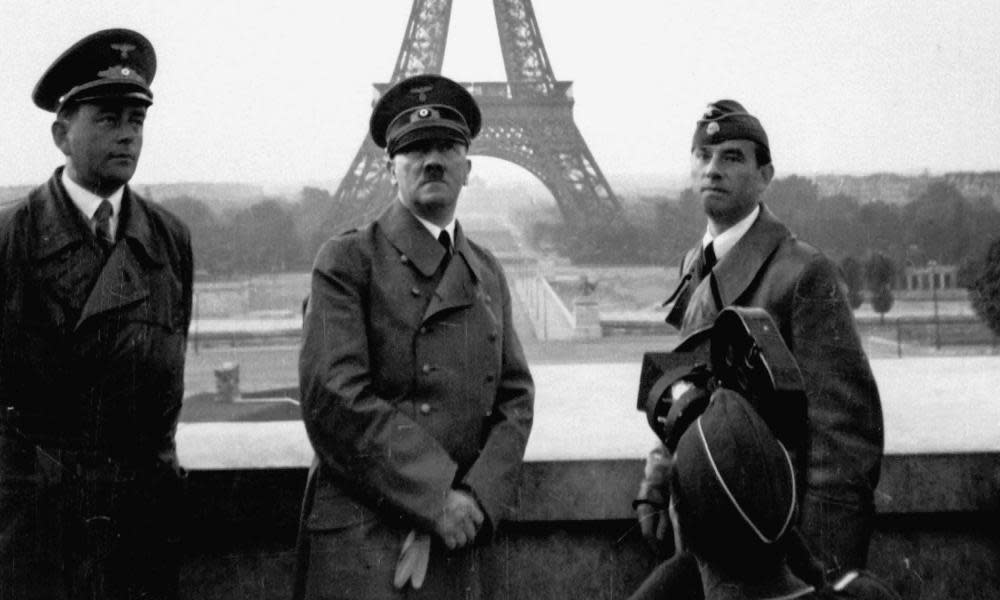Germany paying pensions to Nazi collaborators in UK and Belgium

Nearly 75 years after the second world war, Germany is still paying monthly pensions to collaborators of the wartime Nazi regime in several European countries including Belgium and Britain, according to Belgian MPs and media reports.
The foreign affairs committee of the Belgian parliament this week voted in favour of a resolution urging the German federal government to put an immediate stop to the payments and publish a full list of those receiving them.
“The receipt of pensions for collaborating with one of the most murderous regimes in history is in clear contradiction to the work of remembrance and for peace constituted in the European project,” states the resolution, which was passed unanimously.
The document said nearly 30 people in Belgium are still receiving the payments under a decree by Adolf Hitler granting the same nationality and pension rights as German citizens to foreigners, including Waffen-SS volunteers, from Nazi-occupied territories who pledged “allegiance, fidelity, loyalty and obedience” to the Führer.
German authorities have “consistently refused to communicate the list of pension recipients to their Belgian counterparts, citing legal concerns around the protection of privacy”, according to le Soir newspaper.
The resolution’s authors, five MPs from French-speaking parties, said the monthly payments were made by individual German states and the names of the recipients were known to the German embassy in Brussels.
Responding to the claims, the Germany labour ministry said 18 people in Belgium were receiving war pensions but “there are no former members of the Waffen-SS” among them. It did not name the pensioners or say on what grounds they were entitled to the payments.
Authorities in Belgium were not aware of the pensioners’ identities, the Belgian MPs (Olivier Maingain, Stephane Crusnière, Véronique Caprasse and Daniel Senesael) said, adding that the situation was “the same in the UK, where former SS people also receive payments directly from the German länder [states] without the amounts being taxed or communicated to the British authorities”. The German embassy in London said it did not have any information about the Belgian allegations.
The Belgian state broadcaster, RTBF, said similar payments were also being made in Spain, Sweden and Switzerland and the identities of the recipients were known to German embassies in each country.

Citing the work of a Belgian researcher specialising in the second world war, Alvin de Coninck, RTBF said the payments range from €435 to €1,275 a month, depending on the length of time the recipients – among a total of 80,000 Belgians convicted of various forms of wartime collaboration – had spent in prison after the war.
By contrast, Belgian survivors among the 12 million foreigners from 20 countries who were enrolled in Nazi Germany’s forced labour schemes receive €50.
“This pension shows that Belgian collaborators with the Nazi regime are considered to be like any other kind of worker,” the MPs said, “even if they were convicted of actively participating in the war”, creating a “morally problematic” situation.
The pension payments have continued because Hitler’s 1941 decree was not repealed by the postwar Potsdam Conference of July 1945, at which Britain, the US and the Soviet Union established Germany’s postwar order, deciding on its demilitarisation, dismantling, democratisation and denazification.
German payments to wartime collaborators have been a source of concern in Belgium since their existence was first uncovered by a Socialist deputy in 1997. In 2012, it emerged through parliamentary questions that about 2,500 Belgians were still receiving some form of German state pension, the majority of whom are now thought to have died.
“Among the beneficiaries were some residents of eastern Belgium and Alsace who acquired German nationality after the Nazi invasion, but also Belgians who joined the Waffen-SS during the war,” said De Coninck, the son of a resistance fighter and member of Remembrance, a group of Belgian concentration camp survivors.
In 2017, at the request of Remembrance, Germany’s then ambassador, Rüdiger Lüdekring, told a hearing of the Belgian parliament that as a representative of the federal government he was was unable to give any precise information because the relevant details were held by Germany’s 16 länder.
A Belgian parliamentary commission visited Berlin last year to discuss the issue with their German counterparts. The MPs established that a majority of 27 Belgian wartime collaborators still receiving German pensions were being paid by the state of North Rhine-Westphalia, Belgian media reported.
The present German ambassador to Belgium, Martin Kotthaus, told a Flemish-language news site last year that an investigation was under way to establish what exact role the remaining recipients of the pensions had played during the war.
But despite what the leftwing German MP Ulla Jelpke called a “wholly unacceptable situation”, a German historian, Martin Göllnitz, of Johannes Gutenberg university in Mainz, said he doubted the problem would be resolved in the near future.
German privacy laws would not permit a case-by-case study of the pension recipients, while the German social security system was not subject to eventual criminal law proceedings, Göllnitz said.

 Yahoo News
Yahoo News 
